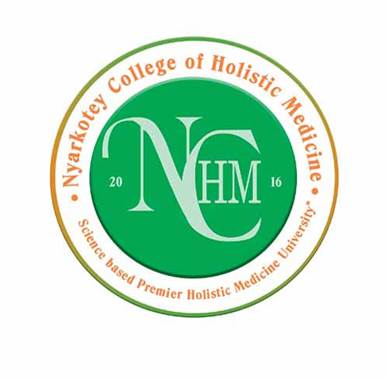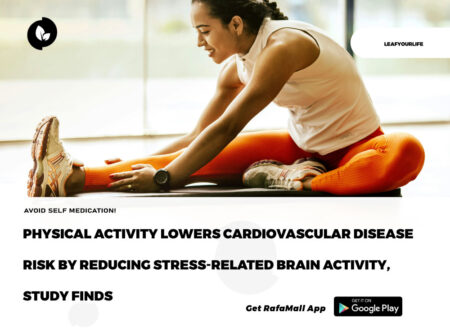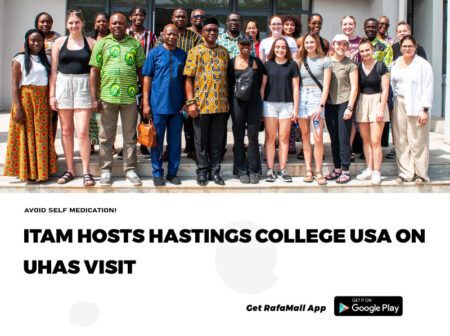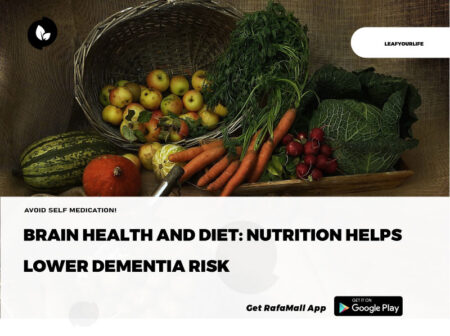
Background of The School
Naturopathic medicine is a distinct primary health care profession that combines the wisdom of nature with the rigors of modern science. Naturopathic physicians are trained as primary care providers who diagnose, treat and manage patients with acute and chronic conditions, while addressing disease and dysfunction at the level of body, mind and spirit. They concentrate on whole-patient wellness through health promotion and disease prevention, attempting to find the underlying cause of the patient’s condition. They provide individualized, evidence-informed therapies that balance the least harmful and most effective approaches to help facilitate the body’s inherent ability to restore and maintain optimal health.
The Nyarkotey College of Holistic Medicine has a simple mission to bring science into Naturopathic Medicines. The field of specialty of the college is Holistic medicine which embraces both conventional standard approaches and alternative medicines to treat patients. The vision of the college is to become the leading and sought after Holistic Medical University in Africa.
Orientation of the School
- Introduced students to their academic advisor
- Register for classes
- College staff takes students on campus tour
- College Staff help students acquired ID cards
- Also help students learn about campus facilities
- Presentation on the legality of Naturopathic medicine in Ghana and international.
Aims & Objectives of The Programme
Naturopathic Medicine is a distinct Primary healthcare system. The naturopathic doctor (ND) degree program integrates both scientific and holistic viewpoints in a rigorous, science-based natural medicine curriculum. The program includes more than 4,100 hours of educational and clinical instruction. The degree program further blends conventional and nature-based medical practices to prepare student for a successful career in natural health sciences. The curriculum follows a sequential course of study in which students continuously build upon a deepening foundation of biomedical and clinical sciences. Concurrently, students are integrating naturopathic philosophy, principles, and therapeutics into their medical knowledge. Students are admitted as a cohort and are expected to follow the curriculum as it is structured. By completing the program, the students will gain the specialist skills needed to become a government registered Naturopathic Physician based on the Traditional Medicine Practice ACT, 2000, (ACT 575), in Ghana jurisdiction only after successfully passing the Naturopathic Medicine Professional examination to be conducted by the Council. At the completion of the programme, students would have met the following requirements for graduation:
- Demonstrated competency in the didactic and clinical portions of the programme.
- Satisfactory completion of a thesis paper. The naturopathic programme, including all graduation requirements, must be completed within four (4) years of matriculation.
Job Description
- Naturopathic doctor working as a primary natural care physician in private practice or in an integrative medicine clinic
- Research in natural medicine
- Naturopathic consultant/advocate in industry, insurance or the political arena
- Wellness entrepreneur
- Natural medicine spokesperson/advisor
- Rural community doctor
- Dietary supplement entrepreneur or natural products specialist
- Corporate wellness educator
- Public health administrator
- Natural medicine author/public speaker
- Faculty member in a naturopathic or conventional medical institution
Employment prospects of students
With the movement toward a healthier and more natural way of living, Naturopathic medicine continues to gain attention. More patients are turning to Naturopathic Physicians to heal their ailments, and this means that there are more job opportunities available. More patients want to rely on this natural way of dealing with medical conditions, and that means there is a great increase in the demand for holistic physicians. More medical facilities are offering holistic healing and related services, and this too contributes to potential job opportunities. The typical working environment for a Naturopathic physician is typical to a traditional medical doctor’s office, but it is definitely more calm and relaxing.
As Naturopath work to analyze, deal with, and treat issues related to the physical, mental, and emotional states, there is a necessity for a calm environment. There are usually exam or treatment rooms that Naturopathic physicians work within, and they have their own comfortable office to work within as well. They may travel to different facilities as the need dictates and certainly will travel to any seminars or training that takes place. Holistic physicians may have a need to travel to a hospital or medical facility if a patient requires the type of care only able to be found there.
Projected Enrolment Statistics
Thirty students per semester
Title of Course
Doctor of Naturopathic Medicine, ND
Certification & Licensure
The Doctor of Naturopathic Medicine, ND, and prospective practitioners are to be licensed as ‘Naturopathic Physicians” by the Traditional and Alternative Medicine Practice Council based on ACT 575 Ghana. The Naturopathic Medicine degree certificate is awarded by the Universidad Empresarial, Costa Rica, Faculty of Holistic Medicine.
Entry Requirements
Professional certificate in any Natural Medicine modalities, WASSCE holders with E8, A and O level , Holders of any biological sciences certificate or degrees from a recognized University or institution, non-science background with any professional certificates or degrees can also apply.
Duration of the course
Four (4) years with 1-year residency at our designated Hospitals
Teaching Methodology and Assessment
- Lecture- face to face
- Virtual lectures with international professors and lectures
- Question and Answer
- Group Discussion
- Case studies
- Essays Demonstration
- Annual public lecture with renowned guests as visiting lectures
- Take home assignment
- Mid-semester exam
- End of semester exam
The degree of Doctor of Naturopathic Medicine Practice will include a unique dissertation of 60,000 words that adds to the existing literature and is publishable in the college peer reviewed journal
Clinical Training
The Doctor of Naturopathic Medicine includes one year supervised clinical training worth a total over 6,000 contact hours at the following centers:
- 6 Month supervised Conventional Standard Training at Tema General Hospital under Medical Doctors, Ghana.
- 3 month supervised training at Herbal Hospital, Ghana.
- 3 month Supervised training at Homeopathic Hospital, Ghana and India.
Biomedical Sciences
Basic sciences are offered simultaneously as an integrative course – a programme unique to the Nyarkotey College of Holistic Medicine in Ghana and Africa. The Biomedicine course is taught six to nine hours per week over the first two years, encompassing physiology, biochemistry, pathology, histology, embryology, pharmacology and laboratory diagnosis. This course promotes an integrative and clinically relevant view of the basic medical sciences. Biomedicine provides us with an ability to foresee potential underlying causes of disease in patients. It also enables them to create and justify treatment rationale, learn a common language for communicating with other medical professionals, and to hypothesize and research theories on the mechanisms behind naturopathic treatments.
Anatomy
Anatomy provides a detailed study of the anatomical structures and systems of the human body. Special attention is paid to palpation of the clinically relevant surface anatomy. The musculoskeletal, vascular, lymphatic, and nervous systems are studied in depth in order to appreciate the relevance of landmarks, and how physical relationships affect functions.
Biomedicine
Biomedicine provides a common framework for describing the structure and functions of the human body. Presented as a synthesis of several fields of study, the Biomedicine courses at Nyarkotey College of Holistic Medicine set out to promote an integrative and holistic view of the basic medical sciences. They provide a comprehensive description of the structure, organization, function and dysfunction of the human body, and the ways in which we measure and manipulate these parameters. Increasing levels of complexity are explored as the courses progress from the lives of cells to the dependent relationships found in systems. After reviewing the biochemical nature of molecular building blocks, the cellular incorporation and metabolism of these molecules is discussed, providing for the cellular creation of tissues which enable the body to develop, grow and sustain life. Next is an examination of how these tissues are consolidated into organs, which participate in complex interrelated systems that support and allow a body to thrive. A great deal of emphasis is placed on cellular metabolism, as this is where our vitality is defended as homeostatic organisms, and it is usually here that pathology begins.
Biomedicine – Biochemistry
The biochemistry component forms the basic language and mechanism of the sciences of physiology, pathology, pharmacology, nutrition and laboratory diagnosis, and addresses the application of biochemistry to naturopathic knowledge and practice. Topics examined in this context include:
- The energetic relationship of molecules
- The nature and function of enzymes
- Cellular regulatory mechanism
- Metabolism of proteins Fats and carbohydrates
- Common metabolic pathways
- Detoxification reactions Acid / alkali balance
- Vitamin mechanisms and nucleic acids and DNA.
Biomedicine – Laboratory Diagnosis
This component teaches students to critically evaluate and apply the results of commonly used laboratory tests. Tests covered in this section of the course include:
- Serological chemistry and haematology
- Urinalysis
- Endocrine panels
Related laboratory parameters and disease states are covered in conjunction with each other throughout the Biomedicine courses in order to best integrate the information and to facilitate the learning process.
Biomedicine – Pathology
The pathology component explores the scientific study of disease. It examines the etiology and pathophysiology of diseases and the potential for progression and sequelae. Beginning with the study of general pathology, the genetic basis of disease, cellular and tissue responses to injury, inflammation, healing and repair and neoplasia, it then progresses to a systematic discussion of specific diseases of the various organs and organ systems of the body, with its greatest emphasis on the most common and clinically relevant disease processes. The pathophysiology of local and systemic changes occurring in the body during illness is discussed to better understand the rationale for methods of diagnosis and treatment in clinical practice.
Biomedicine – Pharmacology
The pharmacology component explores the biological effects and mechanisms of action of pharmaceuticals on the body. Prior to addressing the actions of specific pharmaceuticals, the general principles behind the administration, metabolism, withdrawal and excretion of pharmaceutical agents are examined. For each specific pharmaceutical studied, the mechanism of action is detailed and linked to therapeutic effects, adverse effects, drug interactions and contraindications of the drug. In addition, selected unique adverse events that cannot be linked to the mechanism of action are highlighted.
Biomedicine – Physiology
The physiology component of the course provides a comprehensive coverage of the structure, organization, and functioning of the human body. The course progresses through the cellular, histological, organic and systemic levels to characterize the body as an interrelated and holistic entity. Organ systems are covered in a sequence that describes relevant histology, followed by physiological models of function and homeostatic contribution, and finally a look at the embryological development of that system. Microbiology I Microbiology I examines constructive organization and wholeness in open systems, introducing the Gaia view of the natural world as a whole, organized and selfregulating “super-organism”, and looking at the concept of “deep ecology” and its relevance to naturopathic philosophy.
The course also includes a general overview of the biospheric cycles including carbon, nitrogen, phosphorus and water are covered. The general health effects of pollution (air, water, soil, electromagnetic etc.), species extinction, climate change, biotechnology and the remaking of nature are discussed. The theme of constructive organization in the natural world is extended to an introduction to microbiology. Major groups of microorganisms are identified; archaebacteria, prokaryotes and eukaryotes are explored. Gram-stain and the basic physical elements which differentiate gram positive and gram negative are covered including their antigenic determinants. The major groups which make up grampositive and gram-negative are covered. An overview of prions and viruses is also included. The normal resident and transient flora of the skin, conjunctiva, mouth and upper respiratory passages, intestinal tract, urethra and vagina are then examined in relation to their beneficial roles in health and normal function. The special microbial environments of food and water are considered in relation to infection, pathogenicity, virulence and the role of natural barriers and general immunity in host resistance. The holistic perspective is thus expanded to include the environment and the interface between the individual and the environment as living, dynamic components with both positive and negative health impacts. The course concludes with an exploration of requirements for environmentally sustainable health care and physician-based contributions to environmental health.
Microbiology II
Microbiology II involves the study of various infectious agents and their role in disease in the human body. Transmission, virulence, laboratory identification and diagnosis, pathological presentation and pharmacology of treatment are investigated.
Neuroanatomy
A detailed study of the structure and function of the nervous system. This course expands on the nervous system anatomy covered by the Anatomy courses, and includes the physiology and selected pathologies of the nervous system. Special attention is given to the ascending and descending nerve tracts. The complexities of consciousness, memory, learning and emotion are explored.
Oncology
Oncology provides an in-depth study into the biology of cancer. It describes the cellular mechanisms involved in the development of cancer and the metabolism of neoplastic tissues. It surveys the clinical investigation, staging, grading, epidemiology and tropism of specific cancers. Integrative supports for standard chemotherapy, radiation and surgery are detailed. Naturopathic medicine for cancer prevention, therapy, complications and emergencies are given, with a focus on translating science into clinical practice.
Naturopathic Therapeutic Modalities
We teach all of the current naturopathic modalities to ensure that our students have a well-rounded education. From traditional African, Asian medicine to naturopathic counselling, students receive enough practice hours to be able to perform a wide array of practices upon graduation. When Nyarkotey college students finish their education, they are able to pursue a wide range of career options.
Botanical Medicine I-II
The Botanical Medicine course series provides students with an in depth study of the botanical materia medica and the clinical use of whole plants and extracts. There is substantial time devoted to formulating, compounding and pharmacognosy, as well as toxicology and safety issues. The development of a systematic understanding of the indications and actions of medicinal plants that can be applied practically in the clinical context is emphasized.
Naturopathic Counselling I
Naturopathic counselling prepares students to work with patients, peers and supervisors. The courses have a workplace focus that includes team building and relationship building. This series of courses supports and compliments the integration of personal and professional identity and focuses on how to develop essential clinical rapport with patients; which is the foundation of the doctor-patient relationship. The course starts with patient-centered principles, and then integrates these with the naturopathic therapeutic order. Motivational interviewing is introduced just before students begin their clinical experience. In addition to case conceptualization and communication skills, the courses examine the mind/body relationship and the process of death and dying for both patients and the patient’s clinician. Designed to help the naturopathic doctor understand mental health systems. In the latter years, the counselling courses focus on clinical applications of knowledge and skills when students are working in the clinic.
Homeopathy
This is a four-part sequence that prepares the student to prescribe homeopathic remedies in an acute and classical manner. Early classes define and describe the rationale and use of homeopathics, its theories, and its definitions. Repertory, casetaking, posology, case analysis and case management are covered in detail, with individual remedies subsequently studied. Students will acquire a working knowledge of the homeopathic materia medica and repertory in the treatment of acute and chronic conditions.
Clinical Nutrition I-II
The Nutrition Series begins with an examination of the physiological functions, metabolism, and requirements for all macro- and micro- nutrients. This is followed by concepts in dietary optimization, including phytonutrient intake, dietary influences on the microbiome and identification of food allergies, sensitivities and intolerances. Once these foundational concepts are in place, the nutrition curriculum focuses on clinical nutrition – the assessment and treatment of different health states and diseases with both dietary protocols and neutraceutical supplementation. Topics covered include blood sugar imbalance (hypoglycemia, insulin resistance, diabetes), obesity, cardiovascular disease, sports nutrition, bone health/osteoporosis, brain health (autism, ADHD, mental health, neurodegenerative disorders), chronic renal failure, gastrointestinal disorders, opthalmology, hormone regulation, detoxification and autoimmune disorders. Clinical nutrition is a key part of courses outside the Nutrition Curriculum including Oncology, Dermatology, Geriatrics and Pediatrics. Clinical relevance and individualizing of care are emphasized.
Physical Methods and Agents Program
The Physical Methods and Agents Program provides hands-on training in physical assessment and physical medicine modalities. Included in the course are:
- The evaluation of soft tissue pathologies
- Orthopaedic testing
- Structural analysis Gait analysis, and the examination and assessment of the vertebral column, pelvis, and peripheral joints.
The principles and practice of goniometry and manual muscle testing are introduced. Various systems of soft tissue and osseous manipulation are taught, such as:
- Swedish massage
- Manual lymph drainage
- Trigger point therapy
- Strain/counterstrain
- Fascial release therapy
- Joint mobilization
Training in preventive and therapeutic exercise provides a foundation in the principles, techniques and therapeutic application of exercise and stretching for an improved relationship to one’s body. A patient can experience strides in their strength, coordination, balance, posture, ergonomics, relaxation, and cardiovascular training. The following seven courses comprise the physical methods and agents program:
Manual Therapies
Surveys the electrotherapeutic modalities, such as ultrasound, TENS and laser, and their application in a variety of conditions, including musculoskeletal disorders, and pain management. The hydrotherapy component provides students an in depth understanding of the physiological principles of hydrotherapeutic treatment and the skills to properly apply various hydrotherapeutic procedures, including constitutional hydrotherapy and contrast hydrotherapy.
Exercise and Rehabilitation
Focuses on the rehabilitative education of patients with injured tissues, and the maintenance of healthy ones.
Soft Tissue Mobilizations
This course describes the various techniques for soft tissue work. Naturopathic Manipulation is a four part series of courses that provides a solid basis for the practitioner to determine the need for and perform the specific spinal and peripheral adjustments of joints in the body. The primary focus of this modality is the spinal column.
Physical Medicine I
Provides lecture-style and hands-on training in physical assessment and pathology recognition for the upper extremity (shoulder, elbow, wrist and hand). Included is the evaluation of common myofascial, articular, osseous, neurologic and vascular pathologies of the upper extremity. A variety of core patient assessment methods are identified, including patient history, postural assessment, detailed palpation, range of motion assessment, orthopaedic testing, diagnostic imaging and basic patient management. The principles and practice are also applied with patient simulation exercises and practical clinical examinations. This course allows students to identify pathological dysfunction in the upper extremity, and to select appropriate treatment options given the specifics of each individual case.
Physical Medicine II
Provides lecture-style and hands-on training in physical assessment and pathology recognition for the lower extremity (hip, knee, leg, ankle and foot). Included are the evaluation of common myofascial, articular, osseous, neurologic and vascular pathologies of the lower extremity. A variety of core patient assessment methods are identified, including patient history, postural assessment, detailed anatomy palpation, range of motion assessment, orthopaedic testing, diagnostic imaging and basic patient management. The principles and practice are also applied with patient simulation exercises and practical clinical examinations. This course allows the student to identify pathological dysfunction in the lower extremity, and to select appropriate treatment options given the specifics of each individual case.
Physical Medicine III
Lecture-style and hands-on training in physical assessment and pathology recognition for the axial body (sacroiliac, lumbar, thoracic, ribs, cervical spine and TMJ). Included is the evaluation of common myofascial, articular, osseous, neurologic and vascular pathologies of the axial body. A variety of core patient assessment methods are identified, including patient history, postural assessment, detailed anatomy palpation, range of motion assessment, orthopaedic testing, diagnostic imaging and basic patient management. The principles and practice are also applied with patient simulation exercises and practical clinical examinations. Specifically, this course allows the student to identify pathological dysfunction in the axial body, and select appropriate treatment options given the specifics of each individual case.
Traditional Chinese Medicine
This series of courses provides a working knowledge of the philosophy, theories of diagnosis, and therapeutic concepts and techniques of Traditional Chinese Medicine. It emphasizes and demonstrates the use of acupuncture, tongue and pulse diagnosis, five-element theory, and the basic use of Chinese Asian botanicals.
Clinical Science
In Clinical Science, students will learn the principles and methods that allow them to evaluate and investigate medical treatments. In addition, they will learn about and practice applying the steps involved in laboratory testing.
Clinical Ecology
Clinical Ecology provides students a look into the background, history and mechanisms behind chemical and environmental toxicology. In the course, students will explore strategies for detoxification, various tests, and other evaluative techniques. An in-depth presentation of allergy and allergy testing and treatment methods is included.
Dermatology
Dermatology examines the etiology, presentation and pathophysiology of various skin conditions. Identification of physical presentation is emphasized throughout the module.
Genetics
This module develops an understanding of the role of a person’s genetic makeup and its contribution to their health. The rapidly changing field of genetics and its contribution to medicine is examined and discussed. The course looks at the following specific topics as they relate to genetics:
- General terms
- Normal karyotype
- Examples of Mendelian disorders
- Cytogenetic disorders and single gene disorders with nonclassic inheritance
The role of biotechnology in society, as well as possible naturopathic roles and applications for the treatment of individuals with genetic diseases will be examined.
Geriatrics
This six-week course will cover clinic considerations when doing a historical intake, physical exam, nutritional assessment and laboratory investigation. Some of the more common abnormal non-pathological findings of the geriatric population will be explored. Common pathologies in the geriatric population will be discussed, as well as the naturopathic considerations. This course will also attempt to cover social constructs the geriatric patient may have to endure and discuss possible solutions.
Gynecology
Our Gynecology course examines women’s health from a naturopathic perspective. The course includes the study of normal development throughout the life cycle, understanding of hormone balance and differential diagnosis, investigation and treatment of imbalance or disease. Because many factors specifically affect the health and wellbeing of women, this course takes a holistic, woman-centred perspective on gynecology. In addition to pathologies and allopathic and naturopathic treatments, wider factors are examined – including socioeconomic status and cultural behaviours – to develop a broader perspective on how practitioners can best provide women’s health-care.
Naturopathic Clinical Art and Sciences
These courses are designed to prepare students for the reality of a clinical setting, in which people are human and problems are occasionally unclear. The course will cover many approaches, including Problem Based Learning (PBL), case based collaborative learning, patient research, and case analysis. This course begins with clinical entrance in the third year, and continues to the end of the naturopathic medicine program. It serves as an educational core, uniting the curriculum with clinical practice. The courses include a series of projects in each term based on clinical problems or topical issues. These issues are usually presented as patient cases. It examines each facet of clinical practice to sharpen clinical, diagnostic and treatment skills, case management and professional attitudes. The students are responsible for making the process work. The instructor’s function is to facilitate and support the group by acting as a resource and serving as an unobtrusive educational coach to guide students in reasoning their way through the presented challenge. Learning is promoted through facilitating students’ access to their own prior knowledge, articulation of this knowledge as it relates to the problem, and the identification of the limitations of their knowledge. The instructor also engages students in reflection on the process and provides feedback and evaluation. As the course progresses throughout the program, students become more and more responsible for their own learning and become increasingly independent of the instructor for their education.
Obstetrics
Obstetrics covers natural childbirth in the home or hospital setting. Diagnosis, prevention, and treatment of problems of labour and delivery are addressed. Recognition of high-risk birthing situations and appropriate management are emphasized. Also included is maternal postpartum care and treatment of common lactation problems. The scope of practice of obstetrics for naturopathic physicians and indications and contraindications of naturopathic treatments in the care of the obstetrical patient will be emphasized.
Pediatrics
Pediatrics presents a general overview of pediatric conditions seen in naturopathic practice and the differential diagnosis and assessment of the common problems of infancy, childhood and adolescence. This includes health maintenance, disease prevention, the early diagnosis and naturopathic treatment of common childhood conditions and diseases, and referral where appropriate. Emphasis is on the development of a healthy lifestyle at an early age.
Public Health
Public health will introduce students to concepts of public health. Public health is characterized by community development, active public policy, ecosystem wholeness, and inter-sectoral approaches. This course will emphasize the importance of interprofessional practice and will provide opportunities for students to work with local community health organizations and contribute their naturopathic lens to a community health project.
Clinical Practice and Integration
Prior to beginning their clinical training, our students spend time learning general clinical and emergency practices. This allows students to familiarize themselves with the necessary procedures before starting their clinic shifts.
Emergency Medicine
This course will enable students to assess any emergency situation and respond immediately as a professional first-responder in order to provide basic life support and pre-hospital/pre-ambulance care. Emergency medical skills are developed with a focus on the balance between confidence in established competencies, and being able to recognize the limits of one’s personal knowledge and abilities. The development of referral skills will also be a focus of this course
History and Philosophy of Naturopathic Medicine
This course explores the fundamental seat of naturopathic medical practice. In the age of pharmaceutical prescribing rights, it is critical that graduates understand and apply naturopathic philosophy and principles in case management. This course explores the historical evolution of the naturopathic profession, the principles and philosophy that drive patient care, and an overview of past and pivotal literature.
Master Classes
The Master class series welcomes experts from across the spectrum of health care to share the wealth of experience and insight they have acquired within their particular specialty. These valuable classes allow the students to interact with those making a difference in their communities.
Medical Procedures
The Medical Procedures course provides instruction in performing minor procedures such as suturing techniques, lancing, the use of topical anesthetics and bandaging techniques. The curriculum in Naturopathic Medicine also introduces students to some minor surgical techniques and abreast themselves to refer surgical cases to the conventional hospitals. Minor surgery is any procedure that can be done with local anesthetic, whereas major surgery requires general anesthesia. For example, removing ingrown toenails and stitching a wound would be minor surgeries that are performed in a doctor’s office, whereas an appendectomy and knee replacement surgery require general anesthesia and are not within the scope of naturopathic physicians.
Clinical Training
Clinical training provides clinic interns with the opportunity to learn and develop the skill, knowledge and attitude required to become proficient and effective Naturopathic Physicians. This includes integration and application of core principles, clinical problem solving and diagnostic skills, as well as expertise in ethical patient care and use of core modalities. Clinic interns observe, support, and manage patient care, giving them the opportunity to expand their knowledge and experience under the guidance of professional clinical faculty. Of the 1,400 clinic hours required to graduate, 1100 hours are spent in the teaching clinic, and 125 in precepting roles. The remaining hours are spent on assistant shifts in the clinic (75 hours), and in professional development (100 hours) Integrating what is taught in the classroom with real patient experience is critical to the development of a well-rounded naturopathic clinic intern. At Nyarkotey College, our student, clinicians and clinical supervisors work together as a patient care team. Under the supervision of the licensed naturopathic physician, Medical doctors, the team develops a plan for investigation and diagnosis, and ultimately implements and monitors a treatment plan for each individual patient.
Professional Development
At Nyarkotey College, we believe that Professional Development is integral to the learning experience. As such, we have built a comprehensive professional development program designed to teach students about branding, promotion and relationship building.
Jurisprudence
Nyarkotey college of Holistic Medicine Jurisprudence professional development courses prepare the student for the Traditional Medicine Practice Council professional board exam and licensing. Students will receive instruction on the legislation that governs healthcare practice in general and Naturopathic Medicine in particular. The focus of this course rests on the Traditional Medicine Practice Act 575 as applied to Naturopathic or alternative Doctors in Ghana. The concept of Natural Justice and Jurisdictional Rules are discussed and explored. The bylaws for the Nyarkotey college of Holistic Medicine are also explored. Included in this conversation are the ethical aspects and considerations of clinical practice – duties of the doctor, liability, negligence, standards of care, consent to treatment and confidentiality.
Naturopathic Ethics
Naturopathic ethics focuses on developing the student’s ability to analyze many of the ethical issues that will arise throughout their professional careers. The course begins with an introduction to the professional roles and responsibilities of the naturopathic physician as a health care professional. It starts from the premise that responsibility to others invariably presupposes responsibility to self, and focuses on the integral “owning” of the professional promise to serve the wellbeing and best interests of patients and society. Students will be introduced to philosophical traditions that ground Ghanaian moral and ethical thought. They will then learn to use a model for decision making that will facilitate their efforts to work through ethical issues and dilemmas in the context of health care practice. This framework will guide students in working through topics and issues such as informed consent, right to refuse treatment, patient privacy and confidentiality, cultural issues, respect for persons of difference, ageism, maintenance of professional relationships and boundaries, providing equity in the delivery of health care services, abortion and life and death decision making.
Research
The ability to discern valid from faulty logic while investigating conclusions is an important skill for the practitioner. This course develops these abilities by examining the validity and reliability of research findings, increasing the ability to investigate research, analyzing research design and data collection models, understanding the purpose of using statistics and developing analytical and critical thinking skills. This course is designed to provide students with an introductory understanding of research methods, clinical epidemiology, evidence based clinical practice and research issues pertaining to Naturopathic Medicine. Its aim is to enable students to identify, interpret, appraise and apply research relating to health care. Students will gain an understanding of the research literature and its implication for clinical practice, as well as the ability to apply valid information from the medical literature to educate themselves and their patients. The first two years of the program focus on research literacy and literature appraisal using periodic lectures and seminars on specific topics, along with regular small group discussions and tutorials. In the third and fourth years of the program, students will participate in various forms of research activity, ranging from writing case reports to conducting projects under the guidance of a mentor.
DOCTOR OF NATUROPATHIC MEDICINE, ND
CURRICULUM
| Year 1, Semester 1 | |||||
| DNM 1114 | Y1,S1 | Anatomy – 1 | Major | 3 | |
| DNM 1124 | Physiology -1 | Major | 3 | ||
| DNM | Biochemistry-1 | Major | 3 | ||
| DNM 2114 | Pathology – 1 | Minor | 3 | ||
| DNM | First Aid & Emergency Medicine | Minor | 2 | ||
| DNM | Medical Ethics & Law/Jurisprudence | Minor | 2 | ||
| DNM | Microbiology & Parasitology -1 | Major | 3 | ||
| DNM | Medical Terminology | Minor | 2 | ||
| Total | 21 | ||||
| Year 1, Semester 2 | |||||
| DNM 1114 | Y1,S2 | Anatomy – 2 | Major | 3 | |
| DNM 1124 | Physiology – 2 | Major | 3 | ||
| DNM 2114 | Pathology – 2 | Minor | 2 | ||
| DNM | Biochemistry-2 | Major | 3 | ||
| DNM | Microbiology & Parasitology -2 | Major | 3 | ||
| DNM | Clinical Examination | Major | 3 | ||
| DNM | Biostatistics & Bioinformatics | Minor | 2 | ||
| DNM | Iridology & Live Blood Analysis | Minor | 2 | ||
| Total | 21 | ||||
| Year 2, Semester 3 | |||||
| DNM | Y2,S3 | Pharmacology | Major | 3 | |
| DNM | Y2,S3 | Epidemiology, Public Health & Community Medicine | Minor | 3 | |
| DNM 2310 | Y2,S3 | Clinical Nutrition-1 | Major | 3 | |
| DNM 2311 | Y2,S3 | Naturopathic Medicine -1 | Major | 3 | |
| DNM 2312 | Y2,S3 | Herbal Medicine-1 | Major | 3 | |
| DNM 3164 | Y2,S3 | Detoxification & Toxicology | Major | 2 | |
| DNM | Y2,S3 | Chromotherapy & Hydrotherapy | Minor | 2 | |
| DNM | Y2,S3 | Internal Medicine-1 | 4 | ||
| Y2,S3 | Systems to cover à CytologyImmunologyHematologyCardiologyPulmonologyGastroenterologyDermatology | Minor | |||
| Total | 23 | ||||
| Year 2, Semester 4 | |||||
| DNM 4154 | Y2,S4 | Histology | Major | 2 | |
| DNM 1214 | Y2,S4 | Cell biology and Embryology | Minor | 3 | |
| DNM 2124 | Y2,S4 | Ayurvedic Medicine | Major | 3 | |
| DNM | Y2,S4 | Herbal Medicine-2 | Major | 3 | |
| DNM | Y2,S4 | Naturopathic Medicine-2 | Major | 3 | |
| DNM | Y2,S4 | Laboratory Investigations | Major | 3 | |
| DNM 3214 DNM 4134 DNM 4144 | Y2,S4 | Homeopathic Medicine | Major | 3 | |
| DNM 1224 | Y2,S4 | Internal Medicine-2 | Minor | 4 | |
| Systems to cover à Orthopedic & RheumatologyDentistryEndocrinologyNeurologyNephrologyOtorhinolaryngologyOphthalmology | |||||
| Total | 21 | ||||
| Year 3, semester 5 | |||||
| DNM 3521 | Y3,S5 | Pharmacognosy | Major | 3 | |
| DNM 3522 | Y3,S5 | Minor surgery | Minor | 3 | |
| DNM 3523 | Y3,S5 | Environmental Medicine | Major | 3 | |
| DNM 3522 | Y3,S5 | Medical Imaging/Radiology | Minor | 3 | |
| DNM 3164 | Y3,S5 | Energy Medicine & Bioresonance | Major | 2 | |
| DNM | Y3,S5 | Naturopathic Medicine-3 | Major | 3 | |
| DNM | Y3,S5 | Nutrigenomics & Nutrigenetics | Major | 3 | |
| DNM | Y3,S5 | Neuroscience | Major | 3 | |
| Total | 23 | ||||
| Year 3, semester 6 | |||||
| DNM 3626 | Y3,S6 | Oriental & Chinese Medicine | Minor | 3 | |
| DNM 3627 | Y3,S6 | Naturopathic Pharmacy | Minor | 2 | |
| DNM 3628 | Y3,S6 | Clinical Nutrition-2 | Minor | 3 | |
| DNM 4144 | Y3,S6 | Batch Flower Remedy | Major | 2 | |
| DNM 3224 | Y3,S6 | Medical Genetics | Major | 3 | |
| DNM | Y3,S6 | Physical Medicine -1 | Major | 3 | |
| NCHM | Y3,S6 | Communication skills | Minor | 2 | |
| Total | 18 | ||||
| Year 4, semester 7 | |||||
| DNM 4731 | Y4,S7 | Stem Cell Biology and Regenerative Medicine | Minor | 3 | |
| DNM 4732 | Y4,S7 | Physical Medicine-2 | Major | 3 | |
| DNM | Forensic medicine | Minor | 3 | ||
| DNM 4124 | Y4,S7 | Entrepreneurship & Health Administration | Minor | 2 | |
| DNM 2134 | Y4,S7 | Critical Thinking | Major | 2 | |
| DNM 1313 | Y4,S7 | Gynecology & Natural Child Birth(Obstetrics) | Major | 3 | |
| DNM | Y4,S7 | Pediatrics | Minor | 2 | |
| Total | 18 | ||||
| Year 4, semester 8 | |||||
| DNM 3144 | Y4,S8 | Oncology | Major | 3 | |
| DNM | Y4,S8 | Psychiatry | Minor | 2 | |
| DNM 4838 | Y4,S8 | Pharmacotherapeautics | Minor | 3 | |
| DNM 4839 | Y4,S8 | Urology | Minor | 3 | |
| DNM 2224 | Y4,S8 | Hair tissue & Mineral Analysis | Major | 3 | |
| DNM 4841 | Y4,S8 | Family Medicine | Major | 3 | |
| NCHM | Y4,S8 | Research Methodology & Thesis Writing | Minor | 3 | |
| Total | 17 | ||||
| Total Unit of Courses | 162 | ||||
| Year 5, Semester 9 & 10 | |||||
| Clinical Internship & Dissertation (one Year) |
Clinical Clerkship- One Year Integrated
The Doctor of Naturopathic Medicine Students are eligible to enter clinical clerkships at Tema General Hospital to acquaint themselves with the conventional standard medical practices for a period of six months. The basis is to allow the Naturopathic doctor to understand the standard conventional procedures; abreast and build a clear referral pathway with the Medical practitioners. Students are required to take 6 months of clinical core clerkships at Tema General Hospital and additional 3 months at a prescribed herbal Hospital and another 3 months at a prescribed homeopathic Hospital as electives. The core clerkships in medicine, surgery, pediatrics, family medicine, obstetrics/gynecology and psychiatry are the basic areas of medical practice about which all Naturopathic physicians need to be knowledgeable as well to aid in primary healthcare delivery. They are included in the curriculum of every Conventional and Naturopathic Medical School. Participation in these clerkships also provides students with an understanding of the various core specialties in at the Conventional Medical Sector.
Family Medicine
In this 6 week clerkship, students are introduced to the principles and practice of family medicine. It is an opportunity to begin development of the knowledge, skills and attitudes required to approach a problem in the primary care setting. Students will observe how family physicians provide for ongoing medical needs of their patients within the context of the family and community setting and participate in the care of patients.
Internal Medicine
In this 6 week clerkship, students are introduced to the principles of caring for the medical patient. Students will begin to understand the general process of the application of medical therapy to patients in a wide variety of settings. The student participates as a member of the medical team and observes the role of the internist as a member of the multidisciplinary team providing patient care.
Obstetrics/Gynecology
During this 6 week clerkship, students are introduced to the principles of caring for the OBGYN patient and participate in the various stages of evaluation and treatment of patients. Students will begin to understand the general process of the application of OBGYN specific therapies to patients in a wide variety of settings and participate as a member of a multidisciplinary team for patient care.
Pediatrics
In this 6-week clerkship, students acquire knowledge about the process of growth and development and about common diseases and conditions of childhood. Students work with children and families together to develop an understanding of the importance of preventive medicine and how social and environmental factors affect young people.
Psychiatry
In this 6-week clerkship, students learn through clinical involvement by working directly with patients and being part of the treatment team. Students develop professional rapport with patients, understand the presentation of psychiatric illness, assess patient histories and mental status and develop bio-psychosocial assessment and treatment plans.
Minor Surgery
In this 6-week surgery clerkship, students are introduced to the principles of caring for the surgical patient. Students participate in the care of patients in the various stages of evaluation and treatment by surgeons. The student will begin to understand the general process of the application of surgical therapy to patients in a wide variety of settings as a member of the multidisciplinary team and why the need for the Naturopathic doctor to refer cases when necessary.
Minor surgery includes procedures that don’t invade a body cavity including the abdomen, thorax or cranium. These in-office procedures include wound care, abscess incision and drainage, suturing and other forms of wound closure, punch and elliptical biopsies, tissue removal such as warts, moles, benign and premalignant lesions, and removal of foreign objects (e.g., fish hook). Most require sterile or aseptic technique and injection of local anesthesia.
The Naturopathic Physician acquire minor surgery competencies during their clinical education. In addition to minor surgery, you’ll study, practice and become competent in a range of clinical competencies, beginning in your first year. This is particularly important since research on medical education shows a strong correlation between clinical competencies and future satisfaction in practice.
As your skill set grows, so will your confidence. For example, to competently perform a physical examination, one must first master dozens of site-specific exams. The head and neck alone, comprises examination of the ear, the external and internal eye (including the retina), mouth and throat, nose, skin and scalp, lymph nodes, nervous system, thyroid and cervical spine. Venipuncture (drawing blood) or giving an immunization are fairly simple procedures; followed by the more complex administration of IV fluids and medications. Looking in an adult’s ear is easy compared to examining a febrile child screaming from a suspected middle ear infection. Spinal manipulation requires a sequence of courses beginning with anatomy and neuroanatomy, followed by courses in palpation, physical examination of the spine and finally soft-tissue then osseous manipulation. Minor surgery, first learned in class, then simulated in labs, then practiced in the clinical setting, challenges students’ knowledge, dexterity and composure.
Grading System and Certification CLASS Designation
70-100 A Excellent 70.00-100.00 First Class
60-69 B Very Good60.00- 69.99 Second Class (Upper Division)
50-59 C Good 50.00- 59.99 Second Class (Lower Division)
40-49 D Satisfactory 45.00- 49.99 Pass
0-39 F Fail 0.00-44.99Fail













